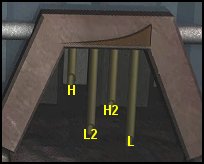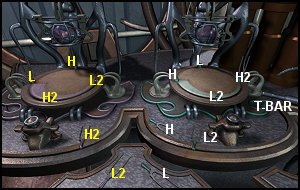INSERTING THE TUNING FORKS | ||||||
| If you play the organ, or have tinkered around with a xylophone, you should know that long pipes produce a low pitched note, whereas shorter pipes produce a higher pitched note. | ||||||
| Did you notice the large T-bar in the centre of the devices? Part of the T-bar is always visible whenever you are close up to a device. Click a tuning fork on this part of the T-bar to listen to the note it makes. | ||||||
PURPLE AND GREEN DEVICES | ||||||
| You know the purple device and the near right mirror are associated with each other. Similarly, the green device and the far left mirror are associated with each other. | ||||||
| The tuning forks having the same colour as the device must be inserted into the slots in the same sequence as the organ pipes below the associated mirror. The sequence is from narrow to wide on the triangles and on the swirls. There are four different notes, and they are designated in the diagram as follows: | ||||||
H=HIGHEST, H2=SECOND HIGHEST, L2=SECOND LOWEST and L=LOWEST | ||||||
| ||||||
| ||||||
| ||||||
| ||||||
PINK AND GOLD DEVICES | ||||||
| You know the pink device and far right mirror are associated with each other. Lastly, the gold device and near left mirror are associated with each other. | ||||||
| The tuning forks having the same colour as the device must be inserted into the slots in the same sequence as the organ pipes below the associated mirror. The sequence is from narrow to wide on the triangles and on the swirls. The notes in the diagrams are designated as follows: | ||||||
H=HIGHEST, H2=SECOND HIGHEST, L2=SECOND LOWEST and L=LOWEST | ||||||
| ||||||
| Note that the triangle above the organ pipes on the near left mirror is reversed. Therefore, the sequence of the tuning forks is taken from right to left. | ||||||
| ||||||
| ||||||
| ||||||





